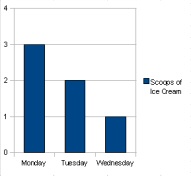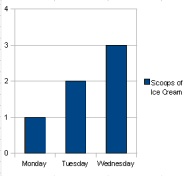June 7th, 2010 — 10:10am
Which would you rather have: 3 scoops of ice cream on Monday, 2 scoops on Tuesday, and 1 scoop on Wednesday, or the reverse, 1 scoop on Monday, 2 scoops on Tuesday, and 3 scoops on Wednesday?
Researchers who study intertemporal decision making (decisions involving a span of time) find that most people prefer the second case, with ascending rewards. Interestingly, this is not the purely rational choice. Receiving the extra ice cream earlier is slightly superior if the goal is maximum benefit, because there is some risk of interruption in the plan before Wednesday. For example, I could get hit by a bus, get sick, the ice cream supply could run out, etc.
One reason for our tendency to choose the ascending sequence is that we prefer to look forward to things getting better rather than dread things getting worse. (I know, dread is a strong word for ice cream, but I can’t think of a word that means mild dread. Word lovers, leave me a comment.)
But another reason for our irrational choice, one I didn’t guess, is that we tend to automatically and subconsciously extrapolate the trend into the future. We include in our mental calculation some assumption that we might get 4 scoops on Thursday in the ascending sequence, and 0 scoops on Thursday in the descending sequence.
I suppose this mental habit is often useful, since many trends do continue into the future. But this mental habit of making decisions based on the assumption that the observed trend will continue also leads to things like economy-destabilizing housing bubbles and bad business decisions. When data is available to rationally evaluate the probability that the trend will continue, be aware of the subconscious tendency to assume, and take a look at the data.
May 24th, 2010 — 8:42am
People, including potential customers, are more motivated to avoid loss than to pursue gain. Fear is stronger than greed.
We also tend to perceive taking action as more risky than not taking action.
These are probably good ways to stay alive if you are a creature trying to avoid being eaten by a predator. They are survival instincts.
So what if you are trying to motivate yourself or someone else to do more than survive, to take action with a potential loss involved?
One way might be to work with this natural fear of loss, by creating an awareness of the potential losses involved in not taking action (not leading, not starting, not purchasing).
Here’s the reality. Inactivity is more risky than activity for humans who aim to do more than survive. And we have more to gain than we have to lose, so in the grand scheme of things potential gain is greater than potential loss. (This is only true of anyone who currently possesses less than half of all the good things on earth.)
In living and in selling, it’s worth balancing these common illusions with some reality from the other side.
May 21st, 2010 — 5:00am
Leadership is having the courage to step out and be in front without permission from everyone or assurance from anyone that everything is going to be ok.
Leadership is valuing people, truth, and results highly enough to say and do uncomfortable things, knowing in advance those things will create conflict.
Stepping out in front is an essential act of leadership, but only when people actually follow does the one in front become a leader.
By directing people and resources toward a common goal, leaders accomplish things that would not otherwise have been accomplished, even though all the people and resources needed were already present before the leader led.
Nothing too big for one person to do alone can be accomplished without leadership, and thus leadership is of great interest to all who dream big.
May 20th, 2010 — 5:25am
A lot of information is lost when data are aggregated into averages and statistics. For example, the best books often get mediocre 2.5 star average reviews on Amazon. Why? That statistic conceals the reality that nobody is giving the book a 2.5 star rating, they either love it and give it a 5 or hate it and give it a 1. The statistic says apathy, the granular data says controversy.
Considering data at a more granular level uncovers meaningful variations that cancel each other out at the aggregate level.
For example, web site stats are useful, but I also like to look at the path an individual visitor took through our web site. This granular look often suggests areas of confusion, or sometimes draws my attention to weaker parts of the site that can use work.
Another application of this idea is to use itemization to stimulate creativity. For example I recently broke the pre-sale customer experience at one of my companies into about twenty distinct steps. I brainstormed how we might improve each step, even the ones that don’t normally seem the most important.
Give yourself the mental limitation of considering only one part of the whole at a time to encourage new combinations of non-obvious ideas.
May 17th, 2010 — 1:28pm
The three most important questions I ask myself when tossing a new business idea around in my head are:
- Will the potential customers find the product or service really helpful?
- Can we do such a good job providing it that the potential customers find it more helpful than their other options?
- Can we inform potential customers about our helpful product or service in a cost-effective way?
This post relates to question #2. Since there is so much competition out there, it helps a great deal to have some unfair advantages, especially in the early years of a startup.
By unfair advantages I mean existing core competencies, relationships with key people in the market, synergies with other businesses, etc. Why compete on a level playing field when you can compete on the part of the field where you have the biggest advantages?
Here’s a personal example. When we started ATS Rentals, a nationwide online audio, video, and projection equipment rental company, we had the following unfair advantages:
- I had previous college work and job experience in a/v and broadcasting technology. I could do my own equipment repairs during the startup phase.
- My most senior employee at my existing business had a degree in video and film production, and tons of gear knowledge.
- I had experience from a previous business of mine that specialized in e-commerce web site development. I could develop the software to run the web site, booking, and shipping system for just the cost of my time.
- We had an existing customer service staff, warehouse, and shipping infrastructure in place that we could share with the new startup. We had everything in place to test-market the concept without hiring a single employee or building out any facilities.
- I had my own capital to fund the startup, avoiding the cost of obtaining financing and carrying the insurance, etc that would be required by the bank or investors.
My point is not that I or my companies are special. My point is I picked a business that fit what we had and were good at, so we would be starting with some unfair advantages.
You have unfair advantages too. Everyone does. I encourage you to know what they are and work them into your plans. Be unfair to your competition on purpose.


